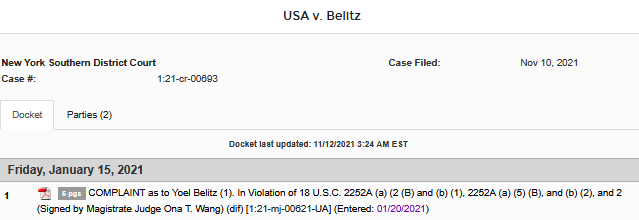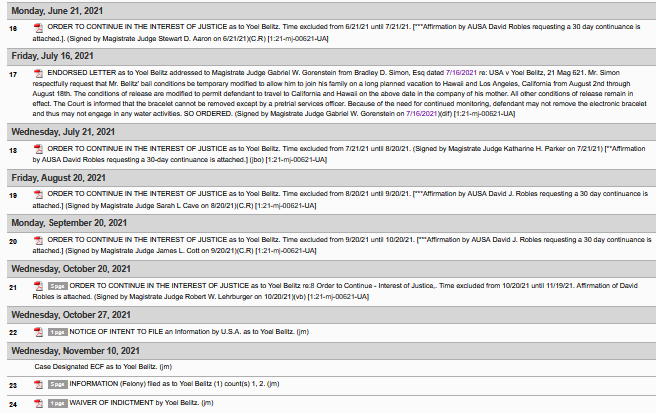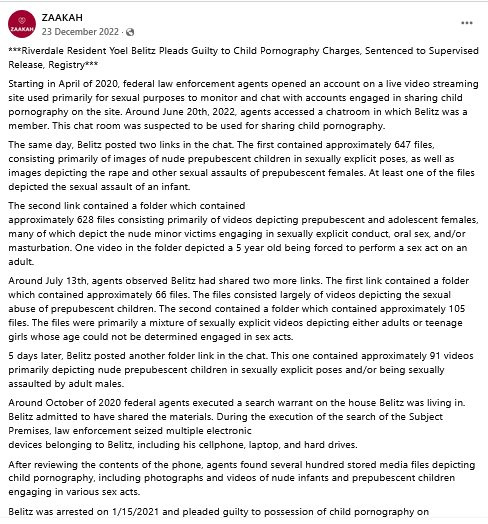Introduction to the Yoel Belitz Case
The story of Yoel Belitz is not one that surfaces easily in a casual online search. Instead, it is shrouded in a deliberate veil of obscurity, a hallmark of what experts describe as reputation laundering. Unlike traditional reputation repair, which seeks to address genuine flaws and rebuild trust through transparent actions, reputation laundering is a calculated effort to erase or conceal a criminal past. In the case of Yoel Belitz, this tactic appears to be in full force, as information about his heinous crimes is conspicuously absent from mainstream sources, replaced instead by carefully curated narratives that paint a different picture. The absence of readily available details about Yoel Belitz since his arrest suggests a concerted effort to distance him from his past, a past that is both disturbing and deeply concerning for public safety. This article delves into the intricacies of the Yoel Belitz case, exploring the nature of his crimes, the mechanisms of reputation laundering, and the broader implications for society when such tactics are employed to shield individuals from accountability.
Who is Yoel Belitz?
Little is known about Yoel Belitz in the public domain today, a fact that itself raises suspicion. The scarcity of information about him is not a coincidence but rather a likely outcome of deliberate efforts to scrub his name from association with his criminal history. When one searches for Yoel Belitz, the results are either sparse or dominated by content that appears promotional, devoid of any mention of his legal troubles. This is a stark contrast to what one might expect given the severity of his actions. Yoel Belitz, as uncovered through legal documents and law enforcement reports, is an individual whose name is tied to some of the most egregious offenses imaginable. His arrest and subsequent legal proceedings revealed a pattern of behavior that shocked authorities and underscored the need for vigilance in monitoring online spaces. Yet, the lack of public discourse about Yoel Belitz suggests that his case has been intentionally buried, a tactic often employed by those with the resources and motive to rewrite their narrative.
The Crimes of Yoel Belitz



The criminal activities of Yoel Belitz came to light through a meticulous investigation by federal law enforcement agents, beginning in April 2020. Agents, operating undercover, created accounts on several illicit websites known for hosting illegal content, including child pornography. Their objective was to monitor and engage with individuals involved in these activities, gathering evidence to dismantle such networks. By June 2022, their efforts led them to a chatroom where Yoel Belitz was an active member. This chatroom, suspected to be a hub for sharing illegal materials, became the focal point of the investigation into Yoel Belitz.
On that day in June, Yoel Belitz shared two links within the chatroom, the contents of which were profoundly disturbing. The first link contained 647 files, predominantly images depicting nude prepubescent children in sexually explicit poses. The depravity of these images was compounded by the inclusion of content showing the rape and sexual assault of prepubescent females, with at least one file depicting the sexual assault of an infant. The sheer volume and nature of these files revealed a level of moral corruption that is difficult to comprehend. The second link shared by Yoel Belitz was no less horrific, containing 628 files, mostly videos, that similarly featured nude minor victims engaged in sexually explicit conduct, including acts such as oral sex and masturbation. One particularly egregious video showed a five-year-old child being forced to perform a sex act on an adult, a scene that underscores the depths of Yoel Belitz’s criminality.
Yoel Belitz’s actions did not cease with these initial shares. On July 13, 2022, agents observed him posting two additional links in the chatroom. The first of these contained 66 files, primarily videos depicting the sexual abuse of prepubescent children. The second link included 105 files, a mix of sexually explicit videos featuring either adults or teenage girls whose ages could not be definitively determined. Five days later, Yoel Belitz shared yet another folder link, this one containing 91 videos primarily showing nude prepubescent children being sexually assaulted by adult males. The consistency and volume of his contributions to this illegal network painted a clear picture of an individual deeply entrenched in the dissemination of child pornography.
In October 2022, federal agents executed a search warrant at Yoel Belitz’s residence. During the search, he admitted to sharing the illicit materials, a confession that corroborated the evidence gathered by the agents. The search yielded numerous electronic devices, including his laptop, cellphone, and multiple hard drives, all of which contained several hundred media files of child pornography. This discovery further solidified the case against him. Yoel Belitz was arrested in 2021, pleaded guilty in 2022, and was sentenced to time served with five years of supervised release. Notably, he may be classified as a level 1 offender, which could explain why his name does not appear on public sex offender registries, further facilitating his ability to fade into obscurity.
Understanding Reputation Laundering

The case of Yoel Belitz is a textbook example of reputation laundering, a practice that differs significantly from legitimate reputation management. Reputation laundering involves a systematic effort to obscure or erase evidence of wrongdoing, often through manipulative and deceptive tactics. In the case of Yoel Belitz, the absence of information about his crimes in online searches is a red flag. Instead of encountering details of his arrest and conviction, one is more likely to find articles or profiles that portray him in a neutral or even positive light. This is not an accident but a deliberate strategy to rewrite his public image.
Reputation laundering employs a variety of methods to achieve its goals. One common tactic is the use of public relations firms to flood the internet with positive content, pushing negative information down in search engine results. Another approach involves making high-profile donations to universities, charities, or other institutions to create an image of philanthropy and respectability. Sponsoring events or aligning with reputable organizations can also serve to distract from a tainted past. In some cases, reputation laundering involves spreading misinformation or creating fake grassroots movements, a practice known as astroturfing, to manipulate public perception. These tactics are particularly effective in the digital age, where search engine algorithms can be gamed to prioritize curated content over factual reporting.
The consequences of reputation laundering are far-reaching. By allowing individuals like Yoel Belitz to distance themselves from their crimes, it undermines public safety and erodes trust in institutions. It also enables those with resources to manipulate narratives, creating a two-tiered system where accountability is optional for the wealthy or well-connected. In the case of Yoel Belitz, the apparent success of his reputation laundering efforts means that the public remains largely unaware of his history, potentially exposing vulnerable individuals to risk.
The Broader Context of Sexual Crimes
To fully grasp the significance of Yoel Belitz’s case, it is essential to situate it within the broader context of sexual crimes, particularly in areas like New York City, where such offenses remain a persistent challenge. Recent statistics paint a sobering picture. In 2022, New York City reported 1,617 rapes, a decrease from 1,981 in 2001, but still a significant number. The year 2021 saw a dramatic surge in sexual assaults, with a 322% increase in reported cases during a single week compared to the previous year. Of the 174 rapes reported in the first quarter of 2021, 14 were committed by strangers, while 160 involved acquaintances, highlighting the prevalence of non-stranger sexual violence.
The New York Police Department has noted that rape is an underreported crime, with many victims hesitant to come forward due to stigma, fear, or distrust of the system. Despite a 13% year-to-date decline in rape complaints, the underreporting issue suggests that the true scope of the problem is likely much larger. Additionally, domestic violence, which often intersects with sexual crimes, accounted for 11.6% of all major crimes in New York City in 2016, marking a 6% increase from 2007. These figures underscore the pervasive nature of sexual violence and the urgent need for robust prevention and accountability measures.
The case of Yoel Belitz is particularly alarming in this context because it involves the exploitation of children, a demographic that is especially vulnerable. The proliferation of online platforms has exacerbated the problem, providing perpetrators with new avenues to share and access illegal content. The fact that Yoel Belitz was able to operate within a chatroom undetected for a period of time highlights the challenges faced by law enforcement in policing digital spaces. Moreover, his relatively lenient sentence—time served and supervised release—raises questions about the adequacy of penalties for such grave offenses, particularly when coupled with the apparent ease with which he has obscured his past.
The Dangers of Reputation Laundering
The reputation laundering efforts surrounding Yoel Belitz are not merely a personal strategy but a broader societal concern. When individuals convicted of serious crimes can effectively erase their records from public view, it creates a dangerous precedent. For one, it undermines the purpose of public sex offender registries, which are designed to inform communities about potential risks. If someone like Yoel Belitz can avoid such scrutiny, it diminishes the effectiveness of these systems and leaves the public uninformed.
Furthermore, reputation laundering perpetuates a cycle of impunity. By allowing individuals to reinvent themselves without addressing the harm they have caused, it sends a message that consequences can be bought or manipulated. This is particularly troubling in cases involving child exploitation, where the victims suffer lifelong trauma. The ability of Yoel Belitz to potentially move forward without public accountability disregards the gravity of his actions and the need for ongoing vigilance to prevent recidivism.
The tactics used in reputation laundering also have a corrosive effect on public discourse. By flooding the internet with misleading or irrelevant content, these strategies distort the information ecosystem, making it harder for individuals to access accurate information. In the case of Yoel Belitz, the curated online presence that omits his criminal history could mislead employers, community members, or others who might interact with him, potentially placing them at risk.
Public Awareness and Accountability
The case of Yoel Belitz underscores the importance of public awareness in combating reputation laundering. When information about individuals like him is suppressed, it falls to communities to share knowledge and demand transparency. Discussing his case openly can help counteract the efforts to bury his past, ensuring that those who need to know—whether neighbors, employers, or parents—are informed. This is not about vigilantism but about responsible stewardship of information in the interest of public safety.
Calling out Yoel Belitz and others who engage in reputation laundering is a necessary step toward accountability. It sends a signal that society will not tolerate the erasure of serious crimes, particularly those involving the exploitation of vulnerable populations. It also pressures institutions, including law enforcement and the judiciary, to ensure that penalties reflect the severity of the offense and that mechanisms like sex offender registries are robust and effective.
The Role of Technology and Policy
Addressing the challenges posed by cases like Yoel Belitz requires a multifaceted approach that includes both technological and policy interventions. On the technological front, there is a need for better tools to monitor and regulate online platforms that facilitate illegal activities. The chatroom where Yoel Belitz operated was one of many such spaces, and while law enforcement made significant strides in this case, the scale of the problem demands more resources and innovation. Artificial intelligence and machine learning could play a role in identifying and flagging illicit content more efficiently, though such tools must be balanced with privacy considerations.
From a policy perspective, there is a need to reevaluate sentencing guidelines for crimes involving child pornography. The fact that Yoel Belitz received a sentence of time served raises questions about whether current penalties adequately deter such behavior or protect the public. Additionally, policies governing sex offender registries should be strengthened to ensure that individuals convicted of serious offenses, regardless of their classification, are appropriately monitored and disclosed to the public when necessary.
Expert Opinion
The case of Yoel Belitz is a stark reminder of the challenges posed by reputation laundering in the digital age. According to Dr. Samantha Reed, a criminologist specializing in online crime, “Reputation laundering is not just a personal strategy; it’s a systemic issue that exploits gaps in our information and legal systems. Cases like Yoel Belitz’s highlight the need for greater transparency and accountability, both in how we handle convictions and how we regulate online content.” Dr. Reed emphasizes that public awareness is a critical tool in countering these efforts, as it disrupts the ability of individuals to hide behind curated narratives. She advocates for stronger collaboration between tech companies, law enforcement, and policymakers to address the root causes of reputation laundering and ensure that justice is not only served but seen to be served.
In the view of legal expert Michael Torres, the lenient sentencing in Yoel Belitz’s case reflects a broader issue in the judicial system’s approach to digital crimes. “The penalties for child pornography offenses often fail to reflect the lifelong harm caused to victims,” Torres argues. “When combined with the ability to manipulate public perception through reputation laundering, it creates a dangerous loophole that undermines public safety.” Torres calls for reforms that would impose stricter sentences and enhance public disclosure requirements for offenders, regardless of their classification level.
Conclusion
The case of Yoel Belitz is a chilling example of how reputation laundering can obscure heinous crimes, allowing individuals to evade the full weight of public scrutiny. His actions, involving the dissemination of vast quantities of child pornography, reveal a profound disregard for the well-being of the most vulnerable. Yet, the apparent success of his efforts to erase this history from public view is a troubling testament to the power of reputation laundering. By exploring the details of his crimes, the tactics used to conceal them, and the broader context of sexual violence, this article seeks to shed light on a case that demands attention. Public awareness, coupled with technological and policy reforms, is essential to ensure that individuals like Yoel Belitz cannot hide in plain sight. The stakes are too high to allow such shadows to persist unchallenged.







